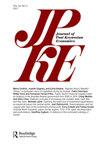Can state and local government capital spending be a vehicle for countercyclical policy? Evidence from new interview and survey data
IF 1
3区 经济学
Q4 ECONOMICS
引用次数: 0
Abstract
Abstract This paper investigates the extent to which state and local government capital spending in the United States can be an effective vehicle for countercyclical policy. Policy responses to recent cyclical downturns have included a variety of policies to encourage greater spending at the state and local level, including efforts to lower borrowing costs for these governments, but the effectiveness of these policies remains unclear. To examine the effectiveness of state-local capital spending as a countercyclical tool, I use a unique data set consisting of open-ended interviews with state and local budget officers and a survey of state governments. I find that at present, there are significant barriers preventing countercyclical state-local capital spending. First, interventions to stimulate capital spending via easing financing conditions are likely limited by two factors: some governments use minimal amounts of borrowing to finance capital spending, and for governments that do rely primarily on borrowing, capital spending appears insensitive to interest rates. Second, state and local capital spending decisions involve substantial lags, making it a poor vehicle for countercyclical fiscal policy even in the absence of financing constraints. Third, state-local budget officials do not view capital spending as a tool for economic stabilization.州和地方政府的资本支出能成为反周期政策的工具吗?来自新访谈和调查数据的证据
摘要本文调查了美国州和地方政府资本支出在多大程度上可以成为反周期政策的有效工具。应对最近周期性衰退的政策包括鼓励在州和地方层面增加支出的各种政策,包括努力降低这些政府的借贷成本,但这些政策的有效性尚不清楚。为了检验州-地方资本支出作为反周期工具的有效性,我使用了一个独特的数据集,包括对州和地方预算官员的开放式采访以及对州政府的调查。我发现,目前,存在着阻碍反周期州地方资本支出的重大障碍。首先,通过放松融资条件刺激资本支出的干预措施可能受到两个因素的限制:一些政府使用最低限度的借贷来为资本支出融资,而对于主要依赖借贷的政府来说,资本支出似乎对利率不敏感。其次,州和地方的资本支出决策涉及相当大的滞后性,即使在没有融资限制的情况下,它也不是反周期财政政策的有效工具。第三,州和地方预算官员并不认为资本支出是稳定经济的工具。
本文章由计算机程序翻译,如有差异,请以英文原文为准。
求助全文
约1分钟内获得全文
求助全文
来源期刊

Journal of Post Keynesian Economics
ECONOMICS-
CiteScore
1.70
自引率
10.00%
发文量
23
期刊介绍:
The Journal of Post Keynesian Economics is a scholarly journal of innovative theoretical and empirical work that sheds fresh light on contemporary economic problems. It is committed to the principle that cumulative development of economic theory is only possible when the theory is continuously subjected to scrutiny in terms of its ability both to explain the real world and to provide a reliable guide to public policy.
 求助内容:
求助内容: 应助结果提醒方式:
应助结果提醒方式:


